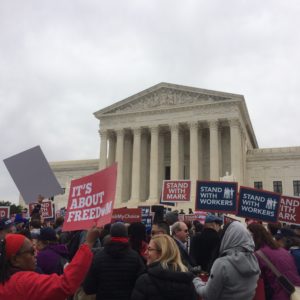The U.S. Supreme Court struck down forced union dues for state government workers this week, in a ruling that restores the First Amendment rights of about 5 million state and local public employees in 22 states. Now, instead of compelling workers to pay for a union and its political agenda (or and risk being fired), workers can decide if they want to support a union financially.
“Forcing free and independent individuals to endorse ideas they find objectionable is always demeaning,” Justice Samuel Alito wrote in the majority opinion. And forcing non-members to pay fees to a union is not consistent with First Amendment principles.
A majority of justices understood that nearly every action taken by government unions during collective bargaining is political, like teacher tenure, pay and discipline for misconduct. This is why Illinois child support specialist Mark Janus, the plaintiff, balked at joining the union. Janus said that the union’s “behavior in bargaining does not appreciate the current fiscal crises in Illinois and does not reflect his best interests or the interests of Illinois citizens.”
Unfortunately, the court decision only resolves half of the problem faced by unions and workers.
While the decision frees public employees from being forced to subsidize government unions, non-members are still forced to work under a union-negotiated collective bargaining agreement and be represented by a union they may disagree with — a situation as repugnant as the forced union dues. For example, government unions typically bargain in favor of pay increases based on a worker’s seniority rather than merit. So a new teacher who excels in classroom is not rewarded by those union-negotiated terms. Instead, teachers should be able to represent themselves and negotiate contract terms tailored to their needs.
Conversely, unions must still represent non-member workers in collective bargaining. This is, understandably, the primary union complaint with Right-to-Work laws that prohibit forced union dues. Workers who do not pay dues can seem like “free riders” who receive union services at no cost to them.
The solution to this problem that works for all sides is a remarkably simple one. States should start passing “Workers Choice” laws that allow “members only” unions. This reform would give workers a choice to pay dues and have a union bargain on their behalf. Or, workers could instead decide to keep their money and represent themselves.
The reform would be a big win for unions, too. Under Workers Choice, unions only represent the people who voluntarily pay dues. Prior to Supreme Court ruling in Janus, government unions had very little incentive to support Workers Choice laws. Up until now, unions could force non-members to pay “agency fees” amounting to as much as 80 percent of full-fledged member dues. But in this new post-Janus era, stripped of the power to compel workers to pay, the members-only approach may seem suddenly much more appealing.
So what is the next step for reform? State lawmakers have an opportunity to reform their labor laws and pass Workers Choice as a common sense policy that benefits workers and unions. Now that we’ve put a stop to the injustice of forced union dues, it’s time for our elected representatives to do their part and put an end to forced union representation.

